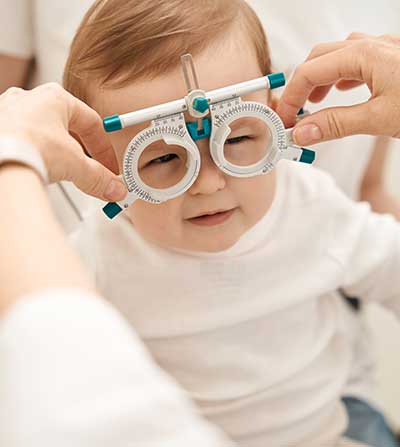Eye Exams in Infants: Birth – 24 Months

A baby’s visual system develops gradually over the first few months of life. They
have to learn to focus and move their eyes, and use them together as a team.
The brain also needs to learn how to process the visual information from the eyes
to understand and interact with the world. With the development of eyesight,
comes also the foundation for motor development such as crawling, walking and
hand-eye coordination.
You can ensure that your baby is reaching milestones by keeping an eye on what
is happening with your infant’s development and by ensuring that you schedule a
comprehensive infant eye exam at 6 months. At this exam, the doctor will check
that the child is seeing properly and developing on track and look for conditions
that could impair eye health or vision such as misalignment or crossing of the
eyes, extreme farsightedness, astigmatism or nearsightedness.
Eye Exams in Preschool Children: 2-5 years old
The toddler and preschool age is a period where children experience drastic
growth in intellectual and motor skills. During this time they will develop the fine
motor skills, hand-eye coordination and perceptual abilities that will prepare
them to read and write, play sports and participate in creative activities such as
drawing or building. This is all dependent on good vision and visual processes.
This is the age when parents should be on the lookout for signs of lazy eye
(amblyopia) or crossed eyes (strabismus). The earlier these conditions are
treated, the higher the success rate.
Parents should also be aware of any developmental delays having to do with
object, number or letter recognition, color recognition or coordination. If you
notice your child squinting, rubbing his/her eyes frequently, sitting very close to
the television or reading material or generally avoiding activities such as puzzles
or coloring, it is worth a trip to the eye doctor.
Eye Exams in School-Aged Children: Ages 6-18 years old
Undetected or uncorrected vision problems can cause children and teens to suffer
academically, socially, athletically and personally. If your child is having trouble in
school or afterschool activities there could be an underlying vision problem.
Proper learning, motor development, reading and many other skills are
dependent upon not only good vision, but also the ability of your eyes to work
together. Children that have problems with focusing, reading, teaming their eyes
or hand-eye coordination will often experience frustration, and may exhibit
behavioral problems as well. Often they don’t know that the vision they are
experiencing is abnormal, so they aren’t able to express that they need help.